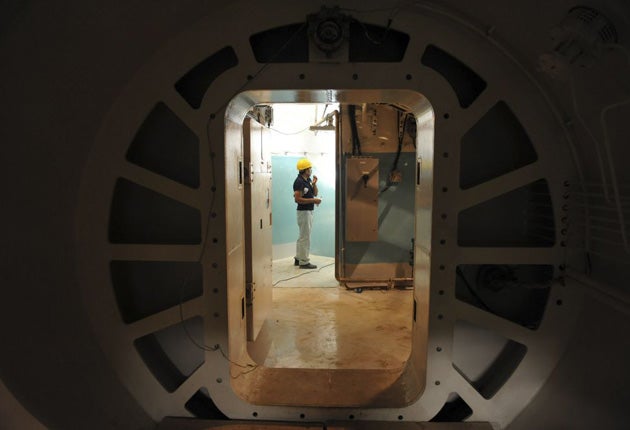Nuclear talks hampered by Iran's uranium boast

Your support helps us to tell the story
From reproductive rights to climate change to Big Tech, The Independent is on the ground when the story is developing. Whether it's investigating the financials of Elon Musk's pro-Trump PAC or producing our latest documentary, 'The A Word', which shines a light on the American women fighting for reproductive rights, we know how important it is to parse out the facts from the messaging.
At such a critical moment in US history, we need reporters on the ground. Your donation allows us to keep sending journalists to speak to both sides of the story.
The Independent is trusted by Americans across the entire political spectrum. And unlike many other quality news outlets, we choose not to lock Americans out of our reporting and analysis with paywalls. We believe quality journalism should be available to everyone, paid for by those who can afford it.
Your support makes all the difference.Pessimism plagued the first talks for more than a year between Iran and seven world powers on the West's concern that Tehran is developing nuclear weapons.
The two-day meeting in Geneva began in unexpected calm but officials said the most they might achieve would be agreement on more far-reaching negotiations next year.
Even this would be significant. Israel has previously hinted that some kind of military action could be taken by the end of this year unless Tehran agreed to limit its nuclear activities.
Two events overshadowed yesterday's talks between senior Iranian officials and delegations from Britain, China, France, Germany, Russia and the United States, as well as the EU.
First, the chief Iranian negotiator Saeed Jalili said the atmosphere had been "burdened" by the assassination by bombing last week of a prominent Iranian nuclear scientist. The Iranian President, Mahmoud Ahmadinejad, has accused the United States of carrying out the attack – something Washington has denied. The EU high representative for foreign affairs, Baroness Ashton, "thoroughly condemned" the assassination yesterday.
The talks have also been affected by the – apparently deliberately timed – announcement by Iran on Sunday that it had successfully mined its own uranium and delivered it to a processing plant. This meant, it said, that it was now self-sufficient in all stages of the enrichment process and immune to sanctions. Western officials are doubtful about the accuracy of this claim.
Nonetheless, early indications suggested both sides were ready to listen to one another in Geneva. The Iranian delegation reacted calmly when told that a commitment was wanted that Tehran would stop the enrichment of uranium (a process which can both fuel reactors and provide the explosive core of nuclear weapons). Hitherto Iran has insisted that a ban on enrichment was non-negotiable.
In Athens, the Iranian Foreign Minister Manouchehr Mottaki made a convoluted declaration that was read by western governments as, at least, not entirely obstructive. He said that the "countries that are participating today in the talks [in Geneva] on the nuclear program have the room to follow a policy to resolve the issue."
"We hope that the talks and the negotiations that started today continue in a constructive way and reach a positive horizon," he said.
President Ahmadinejad was more direct. "Iran has not and will not allow anybody in the talks to withdraw one iota of the rights of the Iranian nation," he said in Tehran.
European officials said the powers wanted Iran to at least answer questions on its nuclear programme and agree to more substantial talks early next year. "The choices are clear for Iran: it can face growing isolation or co-operate," one official told Reuters.
Sanctions on Iran have been increased in recent months. Governments are confident they are hurting the Iranian economy but both the US and Israel say that all options, including military action, remain on the table.
Iran's neighbours are also worried. According to the WikiLeaks revelations of US diplomatic messages, Saudi Arabia has repeatedly urged the United States to bomb Iranian nuclear plants.
Michael Adler, of the Woodrow Wilson International Center in Washington, said the conventional wisdom that negotiations were pointless was shifting. "US and Iranian officials seem in recent comments to be outlining a willingness, or at least tentative steps, toward compromise over the stickiest issue of the nuclear dispute," he wrote.
Join our commenting forum
Join thought-provoking conversations, follow other Independent readers and see their replies
Comments